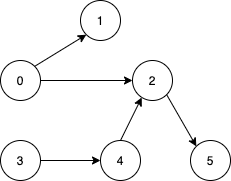1557. Minimum Number of Vertices to Reach All Nodes
Given a ** directed acyclic graph**, with n vertices numbered from 0 to n-1, and an array edges where edges[i] = [fromi, toi] represents a directed edge from node fromi to node toi.
Find the smallest set of vertices from which all nodes in the graph are reachable. It's guaranteed that a unique solution exists.
Notice that you can return the vertices in any order.
Example 1:

Input: n = 6, edges = [[0,1],[0,2],[2,5],[3,4],[4,2]]
Output: [0,3]
Explanation: It's not possible to reach all the nodes from a single vertex. From 0 we can reach [0,1,2,5]. From 3 we can reach [3,4,2,5]. So we output [0,3].Example 2:

Input: n = 5, edges = [[0,1],[2,1],[3,1],[1,4],[2,4]]
Output: [0,2,3]
Explanation: Notice that vertices 0, 3 and 2 are not reachable from any other node, so we must include them. Also any of these vertices can reach nodes 1 and 4.Constraints:
2 <= n <= 10^51 <= edges.length <= min(10^5, n * (n - 1) / 2)edges[i].length == 20 <= fromi, toi < n- All pairs
(fromi, toi)are distinct.
# @lc code=start
using LeetCode
function find_smallest_set_of_vertices(n::Int, edges::Vector{Vector{Int}})::Vector{Int}
set = Set(edge[2] for edge in edges)
res = Int[]
for i in 0:n-1
(i in set) || push!(res, i)
end
res
end
# @lc code=endfind_smallest_set_of_vertices (generic function with 1 method)
This page was generated using DemoCards.jl and Literate.jl.



